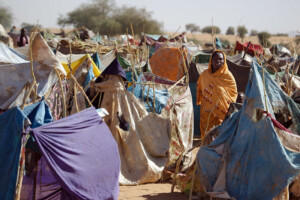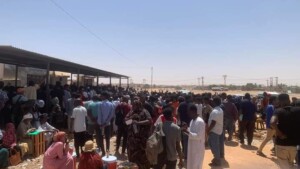Sudan food crisis: Children poisoned in Darfur camp after eating from landfill
The head of the Otash camp for the displaced in South Darfur, Sheikh Abdelrazeg Jales, revealed that a child has died and three others were taken to the hospital in critical condition after being poisoned eating from the landfill in El Kosha near the camp yesterday.
 A displaced child in the former UNAMID safe zone in Um Baru, North Darfur (Hamid Abdulsalam/UNAMID)
A displaced child in the former UNAMID safe zone in Um Baru, North Darfur (Hamid Abdulsalam/UNAMID)
Head of the Otash camp for the displaced in Nyala locality, South Darfur, Sheikh Abdelrazeg Jales revealed that a child has died and three others were taken to the hospital in critical condition after being poisoned eating from the landfill in El Kosha near the camp yesterday, as Sudan’s food crisis worsens.
Jales told Radio Dabanga that the children are forced to eat from the waste areas due to the failure to distribute food to the deserving displaced in the camp. The lack of food is leading to increased rates of malnutrition in the camp.
Mohamed Haroun, only 10 years old, died and three girls aged between 11 and 13 were taken to the hospital in critical condition, Jales reported.
Food crisis
Working Sudanese are unable to make ends meet, and reports of deaths from starvation have been emerging Sudan in recent months, highlighting a growing food emergency that is spreading from rural to urban areas.
Almost 12 million people – a quarter of Sudan’s population – are currently estimated to be facing acute hunger. That number could reach up to 18 million as the ‘lean season’ ends this month, according to aid agencies – double the figure recorded in 2021.
According to a recent report published by the Famine Early Warning System Network (FEWS NET), Sudan’s growing acute food insecurity, recent flooding, and mass displacement as a result of intercommunal conflict, have led to Sudan being classified as a country in ‘crisis’. FEWS NET stated that September’s staple food prices remain 250-300 per cent above respective prices last year, and 550-700 per cent above the five-year average.
Especially displaced people are vulnerable in these times of crisis. Dozens of people reportedly died of hunger in the Foro Baranga camp for the displaced in West Darfur in spring, as national and international aid organisations have faced ongoing challenges accessing and distributing food and goods in the camp since the October 25 military coup.
Jales called on the authorities to protect the agricultural season, especially by providing security to the displaced and their farmlands, to secure food production for the displaced. He described the current season as promising to Radio Dabanga but expressed his fears of herdsmen letting their cattle graze on the cultivated lands.
Farmland
Disputes between herders and farmers occur regularly in Darfur this time of year. As the rainy season ends in September and the herders need fresh pastures, they let their camels and cattle graze on farmlands that have not yet been harvested. Each year, farmers complain about livestock destroying their crops.
In the past, there used to be clearly marked pasture tracks and traditional tribal procedures for the compensation of lost crops, but this has changed during the regime of Omar Al Bashir. The regime supported the ‘Arab’ herding tribes in the region, whilst looking down on non-Arab ‘African’ farmers.
Arab tribesmen were recruited by the previous regime of dictator Omar Al Bashir to join the Janjaweed militias. Al Bashir employed these Arab militias to repress a revolt over ethnic marginalisation in the region, mainly targeting non-Arab African farmers in what became known as the Darfur Genocide. Many of these farmers still live in camps for the displaced.











 and then
and then